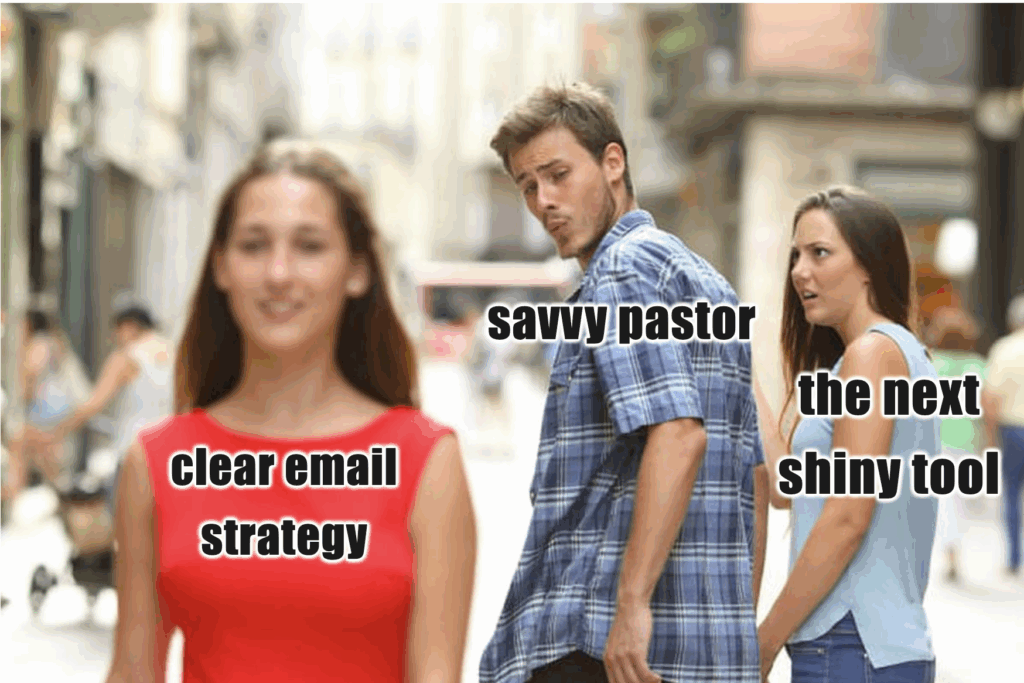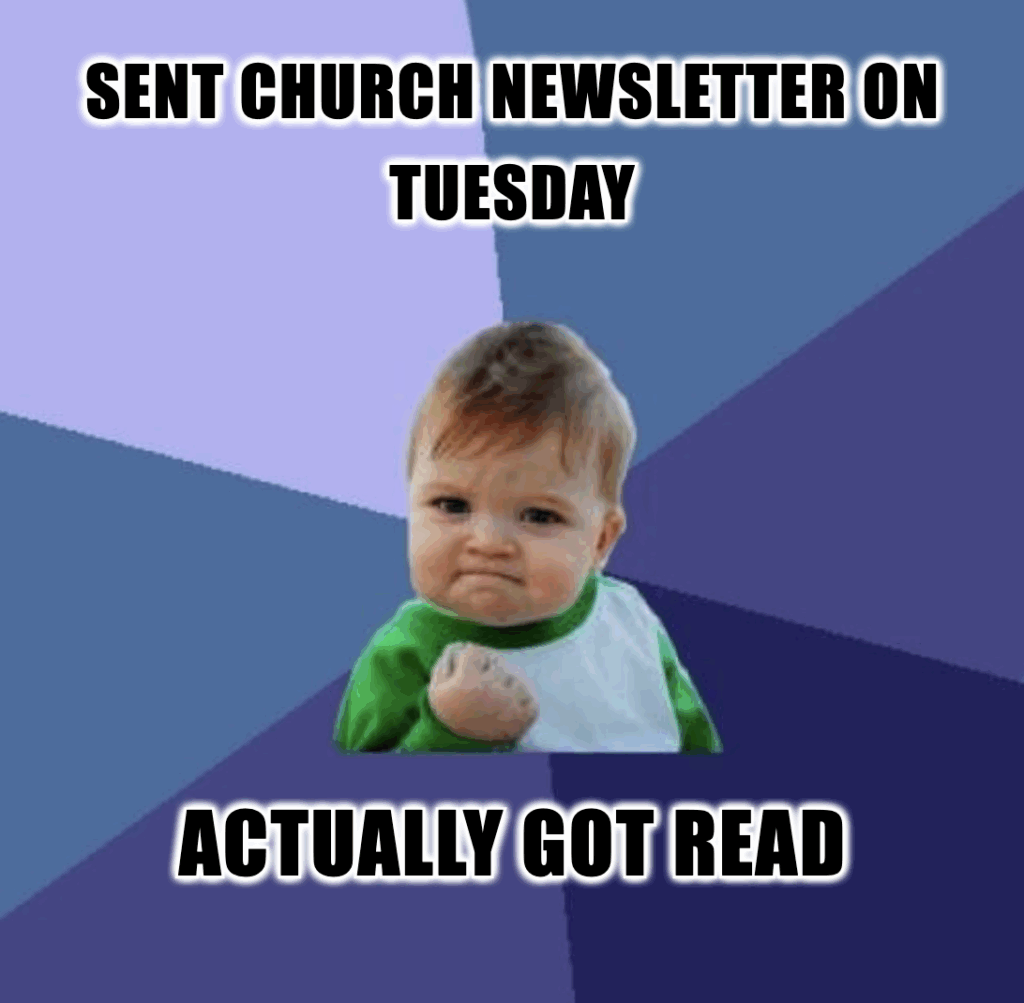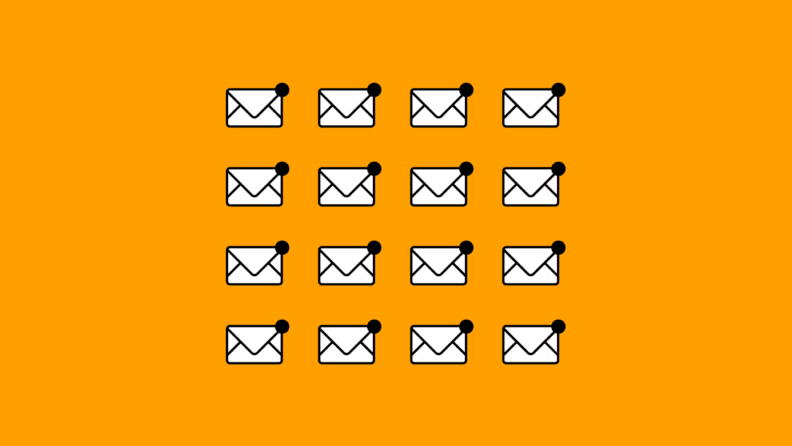Design for smartphones first: A huge portion of email opens happen on smartphones. Make sure your email is formattted with that in mind!
One email a week is enough (usually): Consistency builds trust. Over-emailing trains people to ignore you.
Start with purpose, not platforms: Tools don’t fix unclear goals—clarity does.
Church email marketing isn’t hard because the tools are bad—it’s hard because most churches treat it like a chore instead of a ministry.
I’ve seen it happen: a church launches a Mailchimp account, picks a shiny template, and starts pushing announcements... very little strategy or thought. Just a parade of potlucks and sermon series titles, marching straight into people’s spam folders.
When email becomes an obligation, you end up with:
- Congregants missing key events or updates because they don’t even see the email
- Staff wasting time sending out “reminder” after “reminder” that no one reads
- A communication gap between the stage and the inbox—one that fractures trust and follow-through
But email doesn’t need to be cold, chaotic, or ignored... in fact, it can be simple, straightforward, without much additional admin work. Most church management tools actually offer great email newsletter functionality.
In this article, I’ll share 10 ways to make church email marketing more effective, more pastoral, and a lot easier. No jargon. No marketing fluff. Just practical shifts that help your messages actually reach and serve your people.

Tip #1: Start With the Purpose, Not the Tool Platform
Lots of churches operate this way, I think: they pick a church marketing tool, grab a template, and start sending updates. But without a clear purpose for your email list, your newsletters just becomes noise. A checklist item. Another digital shout into the void.
Before you write your next subject line, ask: Why are we sending this? Who’s it for? What do we want people to feel, understand, or do after reading it?
If your emails don’t point people toward Jesus or deeper community, what are they really accomplishing? A pastoral email strategy will do two things:
- Serve your people by speaking to their real questions, needs, and next steps
- Refocus their attention on Jesus especially midweek, when things can get difficult.
Remember: tool choice is nearly irrelevant if the intent isn’t clear. Start with purpose, make sure it's connected to your wider church communication strategy, then pick your platform.
My first instinct is usually to just jump into something (like livestreaming or using Instagram) - because it seemed valuable, and lots of other folks were doing it as well.
Joshua Gordon
Tip #2: Send One Email a Week (Except for Emergencies)
With church email marketing, the goal should not be constant communication. It should be consistent communication. One good email, sent the same day each week, builds more trust than a dozen updates scattered over 3-4 weeks.
A weekly email works best when it’s:
- Predictable: Sent the same day every week (Tuesday or Wednesday is ideal)
- Scannable: Short, clean, and easy to navigate on mobile
- Actionable: Includes clear links to next steps, not just event recaps
More emails ≠ more engagement. One good one builds credibility. That’s what gets people opening—and acting.

Tip #3: Use The 'Audience Segments' Feature.
Not everyone in your church needs the same email. And when you treat every person like they’re in the same season, you end up with emails that feel vague, irrelevant, or flat-out annoying.
Segmentation is how you respect your people’s time and attention. It’s how you send the right message to the right people at the right time. That’s not fancy marketing—it’s just good shepherding.
Consider segment subscribers into groups based on their connection to your church, such as:
- New Members (folks who've been at your church for less than 6 months): Info about classes, groups, and next steps.
- Parents (folks with kids in the children's ministry): Updates on kids ministry, parenting events, or family resources.
- Volunteers (folks who are serving in your church in some capacity): Schedules, training reminders, and encouragement.
- Etc...
You can still send one church-wide email each week.... but for more targeted communication, list segmentation is super helpful.
Tip #4: Don't Let AI Write It
If AI writes your newsletters... they'll quickly lose their vitality and impact.
The most effective church newsletters come from someone sharing with you, not broadcasting AT you. So... here's a hot tip:
Send your weekly email from a real person (pastor, church leader, volunteer, member). Why is this helpful?
- It builds relational equity. A message with the tone and language of a real member feels more personal—even if it’s short.
- It increases open rates. People are more likely to open an email from “Pastor Jim” than “First Community Church.”
- It humanizes church life. It reminds folks that ministry isn’t just events and reminders—it’s people leading people.
Even if replies go to the church office, that personal tone still creates a sense of connection. And that connection is what turns “just another email” into something worth reading.
Tip #5: Don’t Be Afraid to Repeat Yourself
You’re not annoying people by repeating important info—you’re serving them.
Most folks in your church aren’t glued to your emails. They’re busy. They skim. They forget. And then they feel frustrated or left out when they miss something.
Joshua Gordon
This frustration and feeling of disconnection doesn't happen because you didn’t communicate—it’s because when you're using email... you need to repeat yourself.
Good email strategy repeats key info at least 2–3 times leading up to:
- Event signups
- Registration deadlines
- Special giving opportunities
- One-time classes or groups
Clarity beats cleverness every time. If it’s important, say it again.
Tip #6: Give People a Reason to Subscribe
Don’t assume people will join your list just because it exists. Tell them why it matters—and make it easy to say yes.
Every time someone interacts with your church (online or in person), it should come with a gentle invitation to stay connected. The value has to be clear. Something like:
Subscribers to our email list stay updated on the goings on at our church. Sign up here.
Make sure your email signup form is:
- Visible (not buried in your footer or hidden behind a login wall)
- Accessible (works on mobile and is quick to fill out)
- Everywhere (embedded in event pages, forms, and follow-up flows)
Remember: You’re not selling a product. You’re inviting people into a rhythm of connection. Keep it simple, clear, and valuable.
Joshua gordon
Tip #7: Make Your Emails Worth Opening
If your emails are just rote announcements and logistics, people will treat them like spam—even if they like your church.
But if you include something soulful—a short prayer, a Scripture, a word of encouragement—people will open your emails for more than just info. They’ll open them because it feels like care.
Here’s what helps:
- Start with a one-sentence devotional thought or reflection.
- Include a theme (generosity, presence, forgiveness, etc.).
- Close with a simple encouragement or prayer.
You’re not just delivering updates. You’re pastoring inboxes.
Tip #8: Design for Smartphones (Use Simple Layout + Photos)
Most people check email on their phone. That means long paragraphs and clunky layouts are your enemy. Make your emails easy to skim and scroll. Break things up. Use headers. Include clear links. And add real photos of your people—not just stock images.
What helps:
- Bold headers for sections
- Short paragraphs
- Real faces from your church
- Buttons or links that stand out
If it’s clean and compelling, people will read it—even if they’re in line at the grocery store.
Tip #9: Make It Easy to Find Your 'Subscribe' Form
Don’t bury your email signup at the bottom of your website and hope for the best. Your email list is one of your most valuable communication tools—so talk about it like it matters.
Good places to promote it:
- On stage during your church welcome & announcements
- In your bulletin or connect card
- In your social media marketing
- On your homepage and contact page, near your church's logo
- In every “Thanks for visiting” follow-up
Consider that your own personal online platform as a pastor can drive traffic. If your outreach efforts are primarily on social media platforms, frequent links to your website will drive traffic to the contact form. Get creative with your outreach, and the email subscribers will come to you.
Let people know what they’re signing up for—and why it’s worth it.
Tip #10: Choose a ChMS Platform That Makes This Easier
You don’t necessarily need a fancy tool. You just need something that your team will actually use. Most of the best church management software tools offer this - or at least are very compatible with industry leaders like Mailchimp, Aweber, etc...
Look for something with:
- Drag-and-drop email builders
- Easy list segmentation
- Scheduling and automation
- Mobile-responsive templates
- Solid analytics (opens, clicks, unsubscribes)
Whether that’s Mailchimp, Breeze, or some other tool your church uses to manage their business, pick what works for your context. The right tool saves time, builds trust, and helps your message land where it needs to.
Looking for More Good Stuff? Join Our Newsletter:
If this was helpful, I send out biweekly resources just like this one. Short, practical emails to help pastors communicate better, lead with clarity, and stay grounded in what matters.
Subscribe today for resources and insights to support your ministry.
Because your inbox doesn’t need more noise either.




